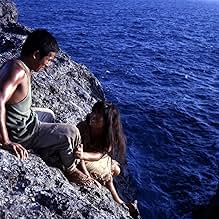CALIFICACIÓN DE IMDb
7.5/10
2 k
TU CALIFICACIÓN
Un ingeniero llega a una isla afectada por sequías con la intención de perforar un pozo para abastecer un molino de azúcar.Un ingeniero llega a una isla afectada por sequías con la intención de perforar un pozo para abastecer un molino de azúcar.Un ingeniero llega a una isla afectada por sequías con la intención de perforar un pozo para abastecer un molino de azúcar.
- Premios
- 5 premios ganados y 1 nominación en total
- Dirección
- Guionistas
- Todo el elenco y el equipo
- Producción, taquilla y más en IMDbPro
Argumento
¿Sabías que…?
- TriviaOfficial submission of Japan for the 'Best Foreign Language Film' category of the 42nd Academy Awards in 1970.
- Citas
Yamamori Futor: He shouldn't take money. The engineer is a god who came from beyond the sea. It will not do to take money for serving that god.
- ConexionesFeatured in Cinéma, de notre temps: Shohei Imamura, le libre penseur (1995)
Opinión destacada
Of all the Imamuras I've seen, this is the one that goes to the desert island with me. "Profound Desires of the Gods" (1968) is a feverishly transportative and sumptuous film. It seems as if when one starts to think nothing happens, everything happens.
Imamura's view of humanity is a curious blend of pessimism and deep, resonant humor to the extent that they seem to cancel each other out. Perhaps this is why his films are so peculiarly observant, and indeed anthropological. In this respect he's successful both as a "realist" (a notion I'm not fond of in the domain of film but which I use here complimentarily) and a visual poet. In fact, some portions of this film strongly foreshadow Malick's "The Thin Red Line" (1998) in the visual depiction of the narrative role of nature.
All of the Imamuras I know have an image (motif) or a scene that become a kind of hub; definitions of the films and something that stay and live on in the memory. In this film there are many, but two images glow strongest: the pit that Nekichi and the Futoris have been digging for years, as well as the final climax at sea.
On the dedicated forum for this film it has been suggested that there are many parallels between this and Teshigahara's "Suna no onna" (1964). I think that's a connection worth acknowledging and at best it enriches both films.
At this writing this film has received only 475 votes, which is a very small number considering this film has been available on Blu-ray courtesy of the Masters of Cinema series (Region B) for two and a half years.
Imamura's view of humanity is a curious blend of pessimism and deep, resonant humor to the extent that they seem to cancel each other out. Perhaps this is why his films are so peculiarly observant, and indeed anthropological. In this respect he's successful both as a "realist" (a notion I'm not fond of in the domain of film but which I use here complimentarily) and a visual poet. In fact, some portions of this film strongly foreshadow Malick's "The Thin Red Line" (1998) in the visual depiction of the narrative role of nature.
All of the Imamuras I know have an image (motif) or a scene that become a kind of hub; definitions of the films and something that stay and live on in the memory. In this film there are many, but two images glow strongest: the pit that Nekichi and the Futoris have been digging for years, as well as the final climax at sea.
On the dedicated forum for this film it has been suggested that there are many parallels between this and Teshigahara's "Suna no onna" (1964). I think that's a connection worth acknowledging and at best it enriches both films.
At this writing this film has received only 475 votes, which is a very small number considering this film has been available on Blu-ray courtesy of the Masters of Cinema series (Region B) for two and a half years.
- kurosawakira
- 31 dic 2012
- Enlace permanente
Selecciones populares
Inicia sesión para calificar y agrega a la lista de videos para obtener recomendaciones personalizadas
- How long is Profound Desires of the Gods?Con tecnología de Alexa
Detalles
- Fecha de lanzamiento
- País de origen
- Idioma
- También se conoce como
- Profound Desires of the Gods
- Locaciones de filmación
- Ishigaki-jima, Ryukyu Islands, Japón(Spelling error)
- Productora
- Ver más créditos de la compañía en IMDbPro
Contribuir a esta página
Sugiere una edición o agrega el contenido que falta

Principales brechas de datos
By what name was El deseo profundo de los dioses (1968) officially released in Canada in English?
Responda























